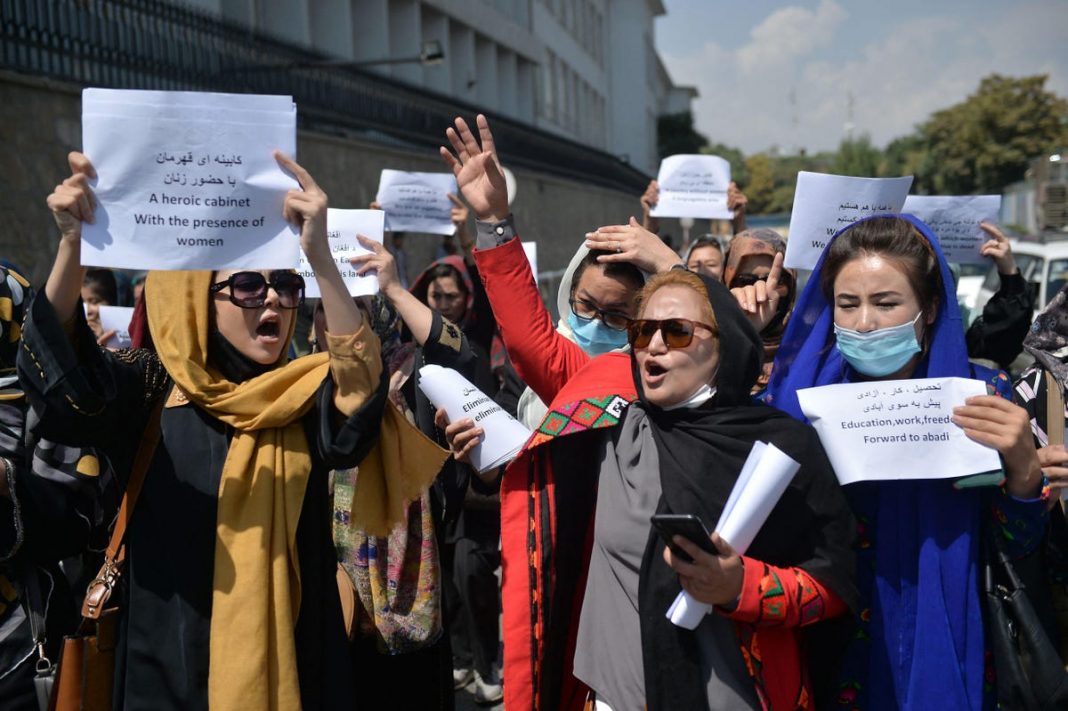Afghan women take part in a protest march for their rights under the Taliban rule in the downtown … [+]
AFP via Getty Images
Amid a flurry of protests and ongoing resistance against the Taliban by women in Afghanistan, the new regime announced what many had been dreading. They said female municipal employees must stay home for the time being and refrain from going to work unless a man cannot fill the positions they hold, the Associated Press reported.
Author and women’s rights activist Homeira Qaderi said that since many men have died in war and women have become breadwinners, they are a cornerstone of a thriving Afghanistan. Keeping them on the sidelines even temporarily can disrupt stability. “If Taliban don’t allow women to go to work, how can women carry on? In Afghanistan there is no men and women—everyone has to work,” she said. Qaderi, who served as senior advisor to the Minister of Labor, Social Affairs, Martyrs and Disabled in Afghanistan until 2020, was a teenager fighting for women’s rights during the last reign of the Taliban. She had created a secret school inside her home, where she devoted all her days and evenings teaching primary education subjects to young girls.
She fears regression is already taking place, which can quickly undo much of the progress the country has seen in the post-Taliban years. Where there were almost no female civil servants in the 1990s, women comprised 21% by 2020, according to a Brookings Institution essay citing UN data. Of those, 16% were in senior management levels and 27% of parliament members were women. The amount of foreign aid coupled with an intentional path toward women’s equality boosted hope for many women. The questionable future of working women has stirred debate and global outcry, but Daoud Sultanzoy, an Afghan-American who was appointed mayor of Afghanistan’s capital city of Kabul by former President Ashraf Ghani, envisions a different future. Sultanzoy underscored the complexity of the current situation, citing how Taliban have not permanently stripped women of their rights, but are in a period of transition. He noted how they are continuing to allow some women to work—those with essential jobs whose “services are needed on a daily basis” and whose roles men cannot take over.
Sultanzoy has been regularly attending to his job despite the overnight shift in government and resulting polarized nation, and he plans to continue his duties until told otherwise. He said the Taliban are working on “bylaws and regulations in terms of work environment that would satisfy their understanding of sharia.” He said his interpretation is they are taking this to the ulama council, or religious scholars for review. “That requires time and preparation,” he said. “The delay is in a way, a sign that they want greater moderation that is both acceptable and both sensible.”
If they wanted to be harsh, he said, Taliban could have made a final proclamation banning women from this sector, but instead they are “going to come with a very definitive definition of what is what when it comes to the work environment.” Previously the Taliban even spoke in favor of including women in its cabinet but timing and execution of such developments remain unclear.
As mayor, Sultanzoy, who lived in the United States for at least two decades and worked as a pilot for United Airlines following the Soviet invasion, has advocated for an equitable place for women in society. His tenure saw an increase in the number of women employees in Kabul by twofold, a rise in the number of women working in official roles and establishment of women’s councils in each district that “enables women to participate in decision-making at very local levels,” according to Sultanzoy. But that was a time when the U.S. was also heavily backing the Afghan government. Between 2002 and 2021, the U.S. Agency for International Development, State and Department of Defense expended close to $800 million for programs “primarily intended to support Afghan women, and an additional $4 billion for programs in which women’s advancement was a component,” according to a 2021 Special Inspector General for Afghanistan Reconstruction report. Congress authorized at least $10 million to support recruitment, treatment and training of women in the Afghanistan National Defense and Security Forces.
Homeira Qaderi left Afghanistan in August fearing for her safety and haunted by the grim reality she had endured over 20 years ago. “I experienced the most painful flight in my life,” she said, juxtaposing the freedom of escaping the Taliban with the bitterness of leaving behind her motherland. “When the military plane was going up, I was falling down.” “It’s like a tree—where somebody suddenly uprooted you. It’s not easy—you’re in shock until now,” she said. Qaderi believes that if she had stayed in Afghanistan, she would have had to battle for her status as a woman.
For Sultanzoy, “it’s above a class issue. Women are not a class—they are human beings,” he said. “We have to elevate the issue of women not just in Afghanistan but in the entire world.” He encourages focusing the lens on the fundamental human issue that is the right of women. “All countries, all societies—if they don’t give women their proportionate and adequate and equitable role, that society half functions.”




